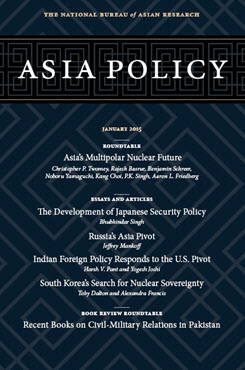Indian Foreign Policy Responds to the U.S. Pivot
This article examines India’s foreign policy response to the U.S. pivot toward Asia and investigates New Delhi’s strategy for dealing with the changing balance of power in the region.
EXECUTIVE SUMMARY
MAIN ARGUMENT
India has emerged as an important constituent of the U.S. strategy of pivoting toward the Asia-Pacific region, aimed at balancing China’s growing power. For India, too, China’s growing military and economic prowess poses a strategic challenge. Yet rather than endorse the pivot, Indian foreign policy shows signs of pursuing a hedging strategy in three distinct realms. First, New Delhi is recalibrating its strategic closeness with the U.S., evident in the drift in the U.S.-India defense relationship over the last few years. Second, rather than balancing China through external help, New Delhi has been trying to normalize its relationship with Beijing, without much apparent success. Third, India is encouraging a more localized form of balancing by increasing its defense partnerships with other regional powers.
POLICY IMPLICATIONS
- The U.S. must be consistent in signaling its commitment and strategy in the Indo-Pacific to help regional powers, including India, shed their reluctance to commit to shaping a more stable regional balance of power.
- The U.S. should encourage greater regional cooperation by pushing for a more substantive Indian presence in the economic and security organizations in East and Southeast Asia. A local balance of power would not only decrease the financial and military burden on the U.S. but also allow regional powers to stand up to Beijing without the U.S. being accused of trying to contain China.
- To fully confront the implications of China’s rise and the U.S.’s relative decline in the region, India needs to augment its strategic partnership with the U.S. while increasing its engagement with Asia’s regional powers. In particular, New Delhi needs to rid itself of its continuing ambivalence about strong defense and security cooperation with Washington.
About Asia Policy
Asia Policy is a peer-reviewed scholarly journal presenting policy-relevant academic research on the Asia-Pacific that draws clear and concise conclusions useful to today’s policymakers. Asia Policy is published quarterly in January, April, July, and October and accepts submissions on a rolling basis. Learn more


